Prasad Bag is a novelist who made his debut with the publication of Maya, The…
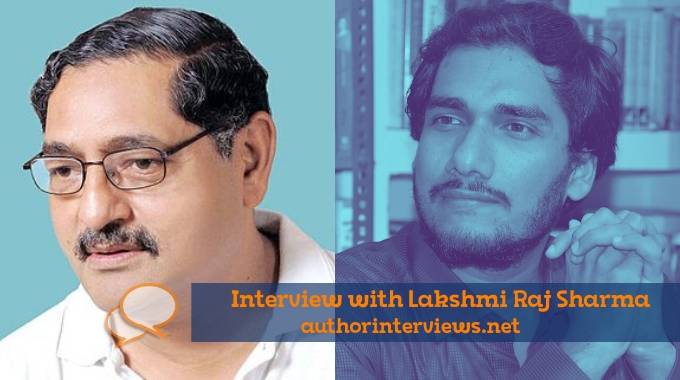
Lakshmi Raj Sharma
Lakshmi Raj Sharma is a popular Indian novelist who has written books like The Tailor’s Needle, Intriguing Women, Saba & Nisha: A love story. He is one among very few Indian authors who work tirelessly to promote literary fiction in India rather than becoming popular with novels that evoke sensualism in the readers. He is also a professor of English Literature at Allahabad University. The writings of Lakshmi Raj Sharma are appreciated by Indian as well as global readers and book critics. His books have also been reviewed very favourably by the leading Indian book review sites because of the novelist’s splendid use of literary devices in his books that keep the readers attached to his writings aesthetically as well as interested in the content.
Alok Mishra: Being a professor of literature, Mr Sharma, what are your immediate views on contemporary Indian English literature? Though the writers are emerging every day, do you think we are on the right course?
Lakshmi Raj Sharma: There are some brilliant writers and poets in India and I believe that they will continue to keep emerging even in the future. It is the readers that are changing because of the changing pace of life. Literary texts are created as much by readers as by writers because the final meaning of texts lies with the readers. If they would want literary works to taper down toward the commercial, then that is what the publishing industry will offer them. Today just telling the story well is what most of our publishers seek; tell it well and simply so that the number of readers can be sized up. Therefore the novels which sell the most are the novels that hover around the structures of Mills and Boon, but written intelligently. Works of literary fiction will be aplenty if the demand for it goes up a little as it is in Europe and in the US. No wonder a number of Indian authors of literary fiction have migrated to the West where there is still a sizeable market for it. I am hopeful that the number of readers in India who hunger for literary writing will grow with time because no period of literary taste lasts forever. I think that our publishers are very largely responsible for the kind of literary fiction we produce and publishers are in turn dependent on our readers. Publishers are ultimately there to earn their bread and butter. We still need Indian authors who can turn the tide against commercial fiction.
Alok Mishra: When and how (and I can also add why) did you start writing? What was the most striking motivation that you can tell the readers?
Lakshmi Raj Sharma: I am the youngest of five very talented brothers and sisters and during my younger days I was awe-struck by them. I was the one who was forced to become a quiet listener or spectator as they performed their talents on the play-ground, stage or at home. This happened until my middle age when my silence got converted into the initial stages of my writing. The opportunity came when I was made in charge of the production of English skits and plays that were staged annually in the Amaranatha Jha Hostel, of the University of Allahabad. Finding the audience not responding well to plays thick with literary connotations, I was forced to experiment with plays I wrote myself that were written with the special audiences that came to watch them. These clicked and then I started writing short stories, which were published in a collection called Marriages are Made in India, published in Kolkata and published as an e-book in America later. Even as these stories were being written I began to work on The Tailor’s Needle which took me seven years to complete. I had a heavy workload at the university because of which I could not devote enough time to writing fiction. This is how I became a writer.
Alok Mishra: The Tailor’s Needle was your debut novel back in 2009. Let’s discuss that. What is the story behind this title, Mr Sharma? And how did you think of a character like Sir Saraswati?
Lakshmi Raj Sharma: My father would often say in Hindi, tumhe darzi ki sooee ki tarah hona chahiye jo har kapde mein ko nikal jaati hai. (You should be like the tailor’s needle that passes through every kind of cloth) This idea settled in my mind and I began to practice it with much success. Since the protagonist of the novel, Sir Saraswati, was such a man, I thought this to be the appropriate title. I thought I’d take it further into the world through this novel. I hope that one day ‘the tailor’s needle’ will become an accepted idiom to describe a flexible person. In 2008, I submitted the manuscript to a British publisher who accepted it within ten days, calling it “a dream fulfilment.” She published it in 2009 but unfortunately became a cancer patient soon after. Just before she died she sold the rights of the book to Penguin Books India who then published it in 2012. My father would tell us stories of the people of the time in which this novel is set. There were very few like Sir Saraswati but they were there, all the same, for others to admire. I decided to let people know about this rare breed of people and created Sir Saraswati. Interestingly, an editor of The Times of India (New Delhi) picked up The Tailor’s Needle and quoted two long paragraphs from it, in the editorial, mentioning a model of education contained in Sir Saraswati’s way of perceiving things.
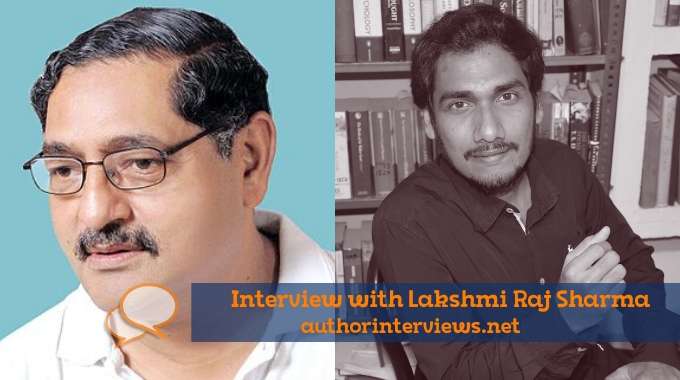
Alok Mishra: Readers are taking an interest in Maneka’s versatile character. In your years of teaching literature, you must have gone through many novels written about Indian freedom struggle but seldom a character as complex as Maneka may never have appeared. What are your thoughts on this?
Lakshmi Raj Sharma: Maneka was drawn from a real woman in those times. I often heard of her courage from my parents in my childhood. I wanted to create the character of a daring woman and so I put most of what I’d heard of that lady into Maneka’s character. I have always wanted to elevate the position of women in the Indian society and I am sometimes disappointed when women don’t live up to my expectations. Authors can be peculiar people, expecting extraordinary things from others. I also expect a great deal from men and women and feel sorry for those who don’t want to be exceptional.
Alok Mishra: Will you please briefly comment on your journey as a writer after your debut novel’s publication in 2009?
Lakshmi Raj Sharma: The Tailor’s Needle was published by Penguin Books India in 2012 and almost simultaneously my first story-collection, Marriages are Made in India, was published in the USA by Publerati.com. It had earlier been published in Kolkata by a poet-publisher. I have loved my American publisher because of his generosity and his kind comments on my writing. He once sent me an email from which I learned that a reader who wanted to sleep early to catch an early- morning flight couldn’t do that because he hadn’t completed Marriages are Made in India. He went straight to the airport without sleeping at all because this book was haunting him even after he had completed it. Americans can be intense readers. I kept half the setting of my latest novel, We Should All Not Be Feminists, in America probably for that reason. This was not done consciously though. In 2012 I travelled to York, UK, to attend an international writers’ conference. I found a London literary agent there who helped me with the publication of my second story-collection, Intriguing Women, in 2016. This book was published by The Paris Press under the White Glove Scheme. Then in 2017, I wrote a novella, Saba & Nisha: A Love Story, in the hope of offering it as a giveaway to increase the readership for my next novel. But then this began to sell well enough and I allowed it to remain in the market as an independent fiction book. Now my fifth book, a novel, We Should All Not Be Feminists, is ready for publication. This book is comic as well as serious. It is not against feminism though it does oppose fake feminism.
Alok Mishra: Coming back to The Tailor’s Needle, you have suggested that it’s largely a comedy of manners. However, readers are also looking at it far more seriously. Will you please throw light on your comedy of manners remark in the context of your debut novel?
Lakshmi Raj Sharma: The Tailor’s Needle is a comedy of manners in part; in the portions where the British Viceroy, Lord Griffin-Tiffin and his mother, come in and where some other British characters are presented. I have chosen this form of writing because I have given to them qualities like wit, social etiquette, affectation and the love of club-life. Sir Saraswati, who has been educated in England, can outsmart these people at their own game. The manners of a few of these English characters can seem artificial compared to the relatively spontaneous manner reserved for Indian characters. Some of the Brits that came to India in the early twentieth century were a little stiff in comparison to the people of these days. Some Indians also adopted this stiffness, in imitation, and I have tried to make a comedy of manners from this. But I have never said that the entire novel is a comedy of manners. It is at best a comedy of manners only in parts. This gives some of the scenes more drama than is usually managed with fictional techniques.
Alok Mishra: Are you also planning to write any non-fiction title, Mr Sharma? I have a theoretical question as well. Do you think that we lack a serious society of literary criticism that could share serious thoughts on our contemporary English fiction in India?
Lakshmi Raj Sharma: I have just completed a book, tentatively titled, Literary Fiction: Its Debt to Shakespeare. I believe that the novel in English right from its origins to now is anchored in Shakespeare. My book attempts to show how Shakespeare continues to speak through literary fiction up to the present, and how he provides it with its basic fulcrum and structure. The book also attempts to arrive at a discussion on the nature of literary fiction.
We Indians have been less critical than Westerners because of our belief in rebirth, which presumes that we suffer because of our sins in past lives. Why criticize people or anything for that matter. Being very critical is a trend emerging gradually in India, with our politicians leading in the blame game. We usually accept a great deal calmly, without questioning too much. Whatever comes to us in the form of criticism comes at the level of leaders, relationships and fate. We do not look at things as rationally and critically as a nation. The Indian critic thinks less on an average and joins the band quite often. We have, after the British rule, also lacked in the self-confidence required to conceive original theoretical concepts. The best critics of our fiction are our writers themselves and those others who are sufficiently detached from what they criticize. We tend to judge on the basis of what we believe rather than what we can examine with aesthetic distance. I do not find many Indian critics of fiction who match up to those in Britain or America, though there are a few exceptions.
Alok Mishra: As a professor of English literature, you must have noticed that the production of quality English poetry in India has decreased. Is it because of lack of support from the publishers or are there other reasons? Do you also plan to write any poetry collection, Mr Sharma?
Lakshmi Raj Sharma: Perhaps you’re right. Publishers don’t welcome poetry-collections with open arms. And that is almost true for the publishing in the West too. It’s all a question of what can be bought and sold in the market. Our poets have disappointed us only because they have not proved themselves as sellable as the novelists. But there isn’t a real shortage of talent. Maybe our poets are not as professional as they ought to be and not with the same strategies employed by poets such as T. S. Eliot to rise to fame. Our poets, the talented ones, are shier and don’t easily jump under the spotlight. They do make groups with other fellow writers and try to move ahead that way but probably lack in dedicated effort in that direction.
I do not consider my own poems good enough. I write short poems for therapeutic effect. And these are mainly for self-consumption and sometimes for a Facebook post. If and when I write proper poetry, I will consider getting them published.
Alok Mishra: And before we conclude this conversation, I would love to know what are your plans in the coming future? What may the readers expect from you next?
Lakshmi Raj Sharma: I plan to write a sequel to The Tailor’s Needle and I have almost completed my third collection of short stories, that will probably be called, “Caverns of the Heart and Other Stories.” I have also almost completed a campus novel which I hope to entitle, “Love Me or Leave Me.”
Alok Mishra: Many thanks for your answers, Prof. Sharma and I wish you the best for all your coming publications.
Lakshmi Raj Sharma: Thanks for giving me this opportunity to discuss matters related to my literary career. I’m indeed grateful to you for giving me this space.

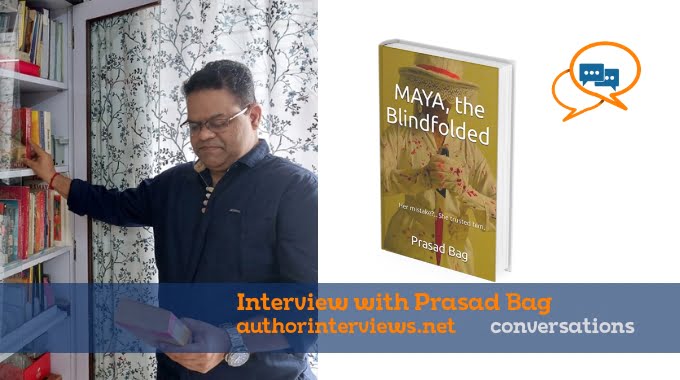
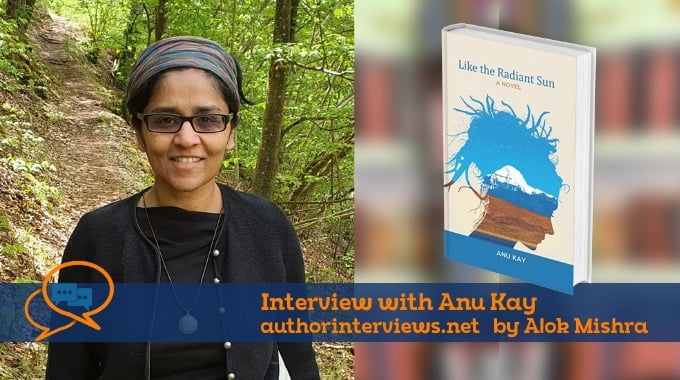
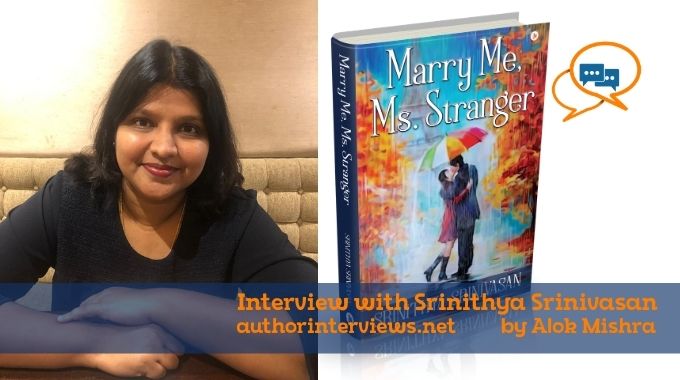
This is a lovely, in-depth interview. The questions are focused and interesting, and the author’s responses are enlightening. As an author, it is always interesting for me to read about literature as both cause and effect. Prof. Sharma’s “The Tailor’s Needle” is an engaging and multi-layered example of how that can be realized through the multi-cultured lives of modern day individuals. Through humor, wit, satire, and irony he examines culture as sort of a cross-pollination of ideas, in a detached manner, and with an eye to the classics. With great anticipation, I look forward to reading his book on Shakespeare, and other upcoming works. Thank you!
This is a very interesting interview… I liked the answers by this novelist as he speaks his mind very clearly. I am sure he has much more to contribute to the literary society in India. And as usual the questions are very well crafted. Keep up the work guys.